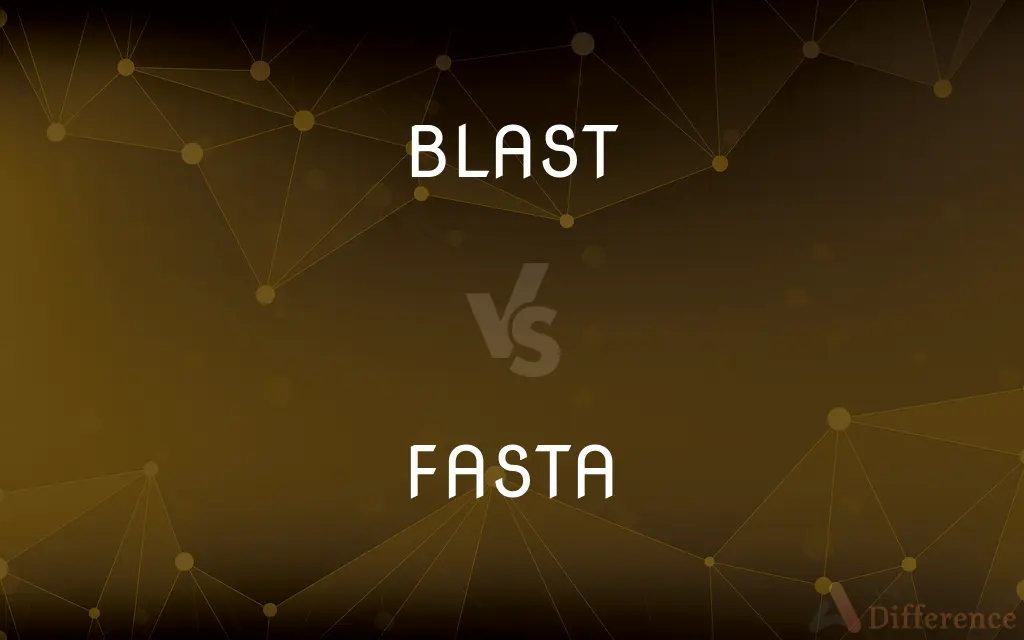BLAST vs. FASTA — What's the Difference?
Edited by Tayyaba Rehman — By Fiza Rafique — Published on December 30, 2023
BLAST (Basic Local Alignment Search Tool) and FASTA are both bioinformatics tools for comparing an input sequence against a database; BLAST is generally faster, while FASTA can be more sensitive.

Difference Between BLAST and FASTA
Table of Contents
ADVERTISEMENT
Key Differences
BLAST, which stands for Basic Local Alignment Search Tool, is a bioinformatics algorithm used to compare an input sequence (DNA, RNA, or protein) to a database of sequences. It is designed to quickly identify sequence regions that are similar between the query sequence and sequences within the database. FASTA, on the other hand, is both a format for representing sequences (as strings of letters) and an algorithm for performing sequence alignments.
BLAST works by first identifying short matches between the query and database sequences, then extending these matches to identify alignments. It is optimized for speed, allowing users to rapidly scan large databases. In contrast, FASTA starts by identifying local regions of similarity, making it potentially more sensitive, especially when the similarity is confined to short regions.
Both BLAST and FASTA have evolved over time, with multiple versions and flavors available that are tailored to specific tasks. For instance, BLAST has variants like BLASTP (for protein sequences) and BLASTN (for nucleotide sequences). Similarly, FASTA has tools such as FASTP and FASTN tailored to their respective sequence types.
In practice, the choice between BLAST and FASTA depends on the specific requirements of the analysis. While BLAST might be preferred for its speed and ability to scan huge databases quickly, FASTA might be chosen for its potential increased sensitivity in certain scenarios.
Comparison Chart
Primary Purpose
Sequence comparison tool
Sequence alignment tool & format
ADVERTISEMENT
Speed vs Sensitivity
Optimized for speed
Can be more sensitive
Initial Matching
Identifies short matches
Identifies local regions of similarity
Variants
BLASTP, BLASTN, etc.
FASTP, FASTN, etc.
Usage
Rapidly scans large databases
Potential for deeper analysis
Compare with Definitions
BLAST
BLAST identifies regions of local similarity between sequences.
With BLAST, researchers can quickly pinpoint shared genetic regions.
FASTA
The FASTA suite of programs includes tools for both protein and nucleotide comparisons.
She employed the FASTP tool from the FASTA suite for her protein sequence analysis.
BLAST
BLAST can compare nucleotide or protein sequences to sequence databases.
After sequencing the gene, she used BLAST to check for homologous sequences.
FASTA
FASTA format consists of a single-line description, followed by lines of sequence data.
The FASTA file contained both the sequence description and the nucleotide sequence.
BLAST
BLAST operates by creating a database of 'words' from the input sequence, then searching for these in the database.
Using BLAST, we could identify specific words of similarity between the two species.
FASTA
FASTA algorithm identifies local regions of sequence similarity.
We used FASTA to align and compare the two DNA sequences for conserved regions.
BLAST
A very strong gust of wind or air.
FASTA
FASTA is considered to be more sensitive than some other methods in detecting short similarities.
For short motifs, FASTA might provide a more detailed alignment.
BLAST
The effect of such a gust.
FASTA
FASTA represents both a sequence format and an algorithm for DNA, RNA, and protein alignment.
I stored the sequences in FASTA format for later analysis.
BLAST
A forcible stream of air, gas, or steam from an opening, especially one in a blast furnace to aid combustion.
BLAST
A sudden loud sound, especially one produced by a stream of forced air
A piercing blast from the steam whistle.
BLAST
The act of producing such a sound
Gave a blast on his trumpet.
BLAST
A violent explosion, as of dynamite or a bomb.
BLAST
The violent effect of such an explosion, consisting of a wave of increased atmospheric pressure followed immediately by a wave of decreased pressure.
BLAST
An explosive charge.
BLAST
(Botany) Any of several plant diseases of diverse causes, resulting in sudden death of buds, flowers, foliage, or young fruits.
BLAST
A destructive or damaging influence.
BLAST
A powerful hit, blow, or shot.
BLAST
A violent verbal assault or outburst
The candidate leveled a blast at her opponent.
BLAST
(Slang) A highly exciting or pleasurable experience or event, such as a big party.
BLAST
To knock down or shatter by explosion; smash.
BLAST
To play or sound loudly
The amplifiers blasted the music.
BLAST
To cause to move with great force; hurl
The volcanic eruption blasted rock far and wide.
BLAST
To make or open by explosion
Blast a tunnel through the mountains.
BLAST
To shoot or destroy by shooting
Fighter jets trying to blast each other out of the sky.
BLAST
(Sports) To hit, kick, or shoot (a ball or puck) with great force.
BLAST
To have a harmful or destructive effect on
A loss that blasted our hopes of making the playoffs.
BLAST
To criticize or attack vigorously
Blasted the mayor for hypocrisy.
BLAST
To cause to shrivel, wither, or mature imperfectly by blast or blight
Crops that were blasted by frost.
BLAST
To use or detonate explosives.
BLAST
To emit a loud, intense sound; blare
Speakers blasting at full volume.
BLAST
To discharge a weapon, especially repeatedly; shoot
Blasted away at the target.
BLAST
To attack someone or something verbally; criticize.
BLAST
To move with great speed or power
A motorcycle blasting down the road.
BLAST
(Electronics) To distort sound recording or transmission by overloading a microphone or loudspeaker.
BLAST
To wither or shrivel or mature imperfectly.
BLAST
A violent gust of wind.
BLAST
A forcible stream of gas or liquid from an orifice, for example from a bellows, the mouth, etc.
BLAST
A hit of a recreational drug from a pipe.
BLAST
The continuous blowing to which one charge of ore or metal is subjected in a furnace.
Many tons of iron were melted at a blast
BLAST
The exhaust steam from an engine, driving a column of air out of a boiler chimney, and thus creating an intense draught through the fire; also, any draught produced by the blast.
BLAST
An explosion, especially for the purpose of destroying a mass of rock, etc.
Arc blast
BLAST
An explosive charge for blasting.
BLAST
A loud, sudden sound.
BLAST
A sudden, pernicious effect, as if by a noxious wind, especially on animals and plants; a blight.
BLAST
A good time; an enjoyable moment.
We had a blast at the party last night.
BLAST
(marketing) A promotional message sent to an entire mailing list.
An e-mail blast; a fax blast
BLAST
A flatulent disease of sheep.
BLAST
(cytology) An immature or undifferentiated cell (e.g., lymphoblast, myeloblast).
BLAST
(transitive) To make an impression on, by making a loud blast or din.
BLAST
(intransitive) To make a loud noise.
BLAST
(transitive) To shatter, as if by an explosion.
BLAST
(transitive) To open up a hole in, usually by means of a sudden and imprecise method (such as an explosion).
Blast right through it.
BLAST
(transitive) To curse; to damn.
Blast it! Foiled again.
BLAST
To shoot, especially with an energy weapon (as opposed to one which fires projectiles).
Chewbacca blasted the Stormtroopers with his laser rifle.
BLAST
(soccer) To shoot; kick the ball in hope of scoring a goal.
BLAST
To criticize or reprimand severely; to verbally discipline or punish.
My manager suddenly blasted me yesterday for being a little late to work for five days in a row, because I was never getting myself up on time.
BLAST
(transitive) To bring destruction or ruin on; to destroy.
BLAST
(transitive) To blight or wither.
A cold wind blasted the rose plants.
BLAST
To be blighted or withered.
The bud blasted in the blossom.
BLAST
To blow, for example on a trumpet.
BLAST
To run a nucleotide sequence (for nucleic acids) or an amino acid sequence (for proteins) through a BLAST (Basic Local Alignment Search Tool).
BLAST
To show displeasure or disappointment: damn
BLAST
A violent gust of wind.
And see where surly Winter passes off,Far to the north, and calls his ruffian blasts;His blasts obey, and quit the howling hill.
BLAST
A forcible stream of air from an orifice, as from a bellows, the mouth, etc. Hence: The continuous blowing to which one charge of ore or metal is subjected in a furnace; as, to melt so many tons of iron at a blast.
BLAST
The exhaust steam from and engine, driving a column of air out of a boiler chimney, and thus creating an intense draught through the fire; also, any draught produced by the blast.
BLAST
The sound made by blowing a wind instrument; strictly, the sound produces at one breath.
One blast upon his bugle hornWere worth a thousand men.
The blast of triumph o'er thy grave.
BLAST
A sudden, pernicious effect, as if by a noxious wind, especially on animals and plants; a blight.
By the blast of God they perish.
Virtue preserved from fell destruction's blast.
BLAST
The act of rending, or attempting to rend, heavy masses of rock, earth, etc., by the explosion of gunpowder, dynamite, etc.; also, the charge used for this purpose.
BLAST
A flatulent disease of sheep.
BLAST
To injure, as by a noxious wind; to cause to wither; to stop or check the growth of, and prevent from fruit-bearing, by some pernicious influence; to blight; to shrivel.
Seven thin ears, and blasted with the east wind.
BLAST
Hence, to affect with some sudden violence, plague, calamity, or blighting influence, which destroys or causes to fail; to visit with a curse; to curse; to ruin; as, to blast pride, hopes, or character.
I'll cross it, though it blast me.
Blasted with excess of light.
BLAST
To confound by a loud blast or din.
Trumpeters,With brazen din blast you the city's ear.
BLAST
To rend open by any explosive agent, as gunpowder, dynamite, etc.; to shatter; as, to blast rocks.
BLAST
To be blighted or withered; as, the bud blasted in the blossom.
BLAST
To blow; to blow on a trumpet.
Toke his blake trumpe fasteAnd gan to puffen and to blaste.
BLAST
A long and hard-hit fly ball
BLAST
A sudden very loud noise
BLAST
A strong current of air;
The tree was bent almost double by the gust
BLAST
An explosion (as of dynamite)
BLAST
A highly pleasurable or exciting experience;
We had a good time at the party
Celebrating after the game was a blast
BLAST
Intense adverse criticism;
Clinton directed his fire at the Republican Party
The government has come under attack
Don't give me any flak
BLAST
Make a strident sound;
She tended to blast when speaking into a microphone
BLAST
Hit hard;
He smashed a 3-run homer
BLAST
Use explosives on;
The enemy has been shelling us all day
BLAST
BLAST is an acronym for Basic Local Alignment Search Tool.
I used BLAST to find similar protein sequences in the database.
BLAST
BLAST provides statistical information about an alignment.
The BLAST results highlighted the statistical significance of the sequence match.
Common Curiosities
Which is faster, BLAST or FASTA?
BLAST is generally faster, especially for large databases.
What does BLAST stand for?
BLAST stands for Basic Local Alignment Search Tool.
In what scenario might one prefer to use FASTA over BLAST?
FASTA might be preferred for its potential increased sensitivity, especially for short regions of similarity.
Is FASTA a format or an algorithm?
FASTA is both a format for sequences and an algorithm for sequence alignment.
How is the FASTA format structured?
The FASTA format starts with a single-line description, followed by lines of sequence data.
How does the FASTA algorithm work?
The FASTA algorithm identifies local regions of sequence similarity.
What kind of databases can BLAST scan?
BLAST can scan nucleotide or protein sequence databases.
Is the FASTA algorithm more sensitive than BLAST?
FASTA can be more sensitive, especially in detecting short similarities.
What are some popular variants of FASTA tools?
Popular variants include FASTP for proteins and FASTN for nucleotides.
Are there different versions of BLAST for different tasks?
Yes, there are variants like BLASTP, BLASTN, and others tailored for specific sequence types.
Can I use BLAST for protein sequences?
Yes, there is a variant of BLAST called BLASTP specifically for protein sequences.
Why is BLAST commonly used in genomics research?
BLAST is quick and efficient in scanning large databases to identify sequence similarities.
Can I store multiple sequences in a single FASTA file?
Yes, you can store multiple sequences in a FASTA file, each with its own description line.
How does BLAST produce alignment results?
BLAST identifies short matches and then extends these matches to create alignments.
Share Your Discovery

Previous Comparison
High Court vs. Supreme Court
Next Comparison
Lipstick vs. Lip ColorAuthor Spotlight
Written by
Fiza RafiqueFiza Rafique is a skilled content writer at AskDifference.com, where she meticulously refines and enhances written pieces. Drawing from her vast editorial expertise, Fiza ensures clarity, accuracy, and precision in every article. Passionate about language, she continually seeks to elevate the quality of content for readers worldwide.
Edited by
Tayyaba RehmanTayyaba Rehman is a distinguished writer, currently serving as a primary contributor to askdifference.com. As a researcher in semantics and etymology, Tayyaba's passion for the complexity of languages and their distinctions has found a perfect home on the platform. Tayyaba delves into the intricacies of language, distinguishing between commonly confused words and phrases, thereby providing clarity for readers worldwide.













































